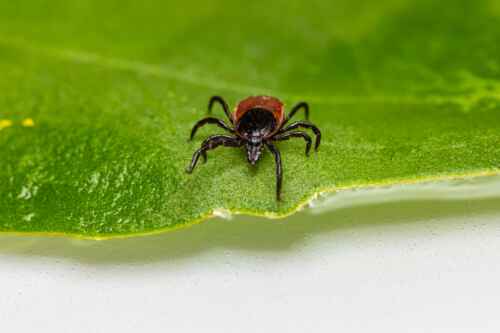Improved diagnosis and prevention of Lyme disease may result from tracking Google searches for terms like “Lyme disease” and “ticks,” according to a new study by University of Guelph researchers.
As the disease continues to spread in Canada, this first-ever study linking internet search activity with local infection rates may give public health units a tool to monitor that spread and warn people about Lyme hot spots, said Dr. Olaf Berke, a statistical epidemiology professor in the Department of Population Medicine in the Ontario Veterinary College (OVC).
“When people search online for a problem, chances are there is a problem,” he said. “If we know from Google Trends that in certain areas there are ticks, then physicians might take that into account in diagnosing infection.”
Lyme disease is caused by the bacterium Borrelia burgdorferi and transmitted by blacklegged ticks, which have moved into central and eastern Canada in recent years. It’s the most reported vector-borne disease in the United States and is Canada’s most common tick-borne illness.
Ticks’ northward spread believed to reflect climate change, urbanization

Reported cases in Canada increased to almost 1,500 in 2018 from about 150 in 2009, mostly in Ontario, Quebec and Nova Scotia. Scientists have blamed the increase on everything from warming climate enabling ticks’ northward spread, to increased urbanization that brings people into closer contact with the organisms and their normal animal and bird hosts.
The team looked at reports of Lyme disease from 28 public health units in southern Ontario between 2015 and 2019. The researchers then compared that information with Google Trends data for the same regions and years.
They found that most infections occurred in eastern Ontario, between Prince Edward County and the Ontario-Quebec border. The same area showed more frequent internet searches for terms such as “Lyme disease,” “ticks” and “tick bites” than other parts of the province.
The study involved first author Maria Kutera, a fourth-year undergraduate student in biological science, and PhD candidate Kurtis Sobkowich. Their paper appeared recently in the journal Environmental Health Review.
Referring to Kutera’s mapping of trends, Berke said, “There was a signal for searches with Lyme diseases that overlapped with where people had been more often infected with Lyme disease.”
Study findings point to further research, prevention focus

Other studies have suggested such a relationship, he said, but this new research provides the first clear link between internet activity and disease prevalence.
Referring to potential limitations of the study, Berke said Lyme disease cases may be under-reported in various regions and that people may contract infection in one area before reporting it in another. Also, he added, internet searches may reflect searchers’ curiosity rather than suspected local infections.
Still, he said, the study findings suggest an avenue for other researchers to replicate and for health authorities to focus on geographic regions.
Noting the difficulty in diagnosing Lyme disease, Berke said, “Public health would like to prevent the public from getting ill with Lyme disease. Public health has a good idea where ticks are, but this changes from year to year. If we can get the information from people searching the internet, we can improve Lyme disease diagnosis and treatment, and public health can issue public notices.”
Lab tests to diagnose infection take time to perform; social media may provide an alert within days. “You have more immediate access to data. It’s cheaper, and we can try to learn how to include this information to make disease surveillance more robust.”
A recently announced $100,000 award from the Global Lyme Alliance, a charitable organization based in the United States, will allow microbiologists in U of G’s College of Biological Science to conduct further research into Lyme disease.
The researchers will test a theory that Lyme disease-causing bacteria create biofilms that help it resist the body’s immune defences.
Contact:
Dr. Olaf Berke
oberke@uoguelph.ca
